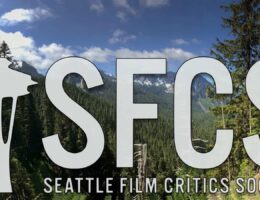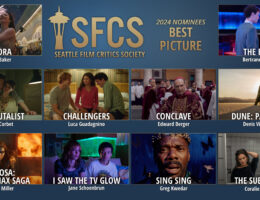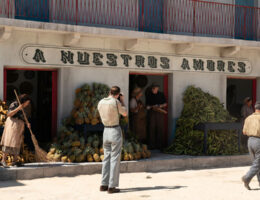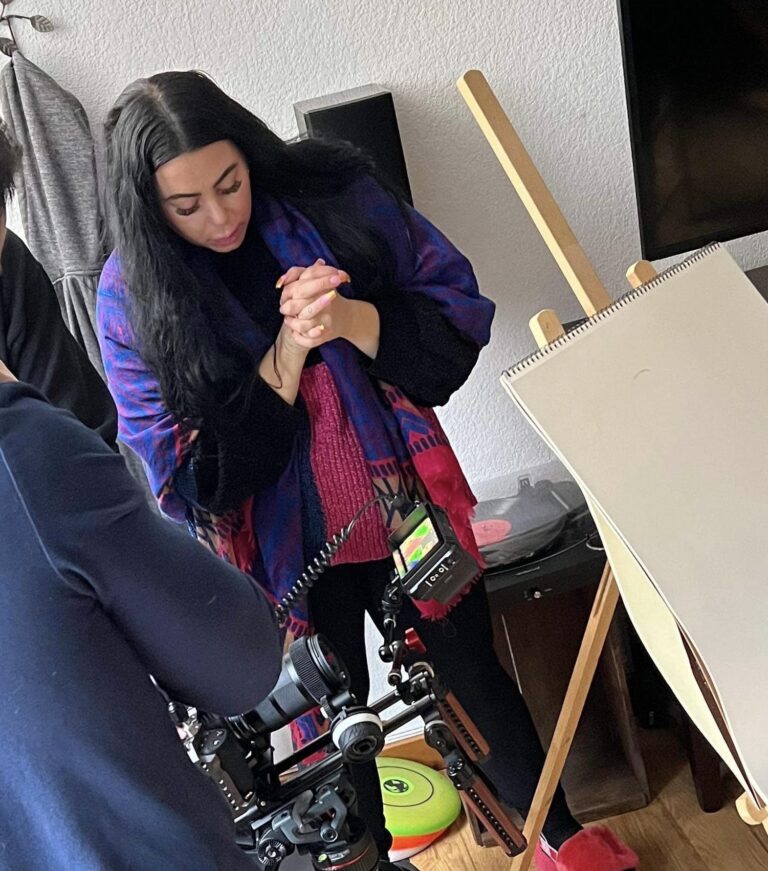When Seattle indie filmmaker Rose Kreider asked me to check out her 2022 debut film The Woman, I was thoroughly impressed. It was a beautifully told story about a UW art student who discovers that his adopted mother hasn’t been fully truthful about how he came into her life and he must navigate the choices that this new information opens. By the end I was crying my eyes out. It was nuanced and empathetic. It is also very much a Pacific Northwest film. You’ll notice streets you’ve likely driven up and down in King and Snohomish Counties, among other familiar places. I had a hard time believing that it was made with such a low budget in such a short period of time by a first time filmmaker. Still, it’s a wonder. It’s the work of a person with a vision and drive (and a hardworking and dedicated cast and crew).
Her second film is a short called A Room by the Road, a crime thriller that has plenty of tension in its seven minutes. It’s about a robbery that goes wrong and the trouble that ensues when the money ends up in the wrong hands. Like The Woman, it’s a product of the Pacific Northwest, recognizable to locals without featuring well-known landmarks.
With another short film on the way, I wanted to talk to Rose Kreider about her journey from model to actress to filmmaker, how she’s been able to do so much herself, and what is coming up for her in the immediate future.
Let’s start at the beginning: Can you talk about your film career and how you got started in film and making movies?
So in 2020 I was offered a competition to put in a photo for a photo competition since everything was remote and I forgot about it. And two months later I actually won most photogenic and that got me a spot to be considered for New York Fashion Week. And then we had another competition online where everyone submitted photos and videos of themselves and the top three winners got to go to New York for New York Fashion Week as a model, and I won. And so that kind of jump started my career in general. I started doing modeling for two years, realized that wasn’t the path that I wanted to take. Then I started familiarizing myself with actors in the Pacific Northwest, and I started acting. As I was acting, I was offered a role that was for a short film and I was the main character, and I wasn’t enjoying my experience as an actor and I was actually interested in what the director’s role was about.
So I started studying that and then I decided to create my own film. I had a dream about a movie that I found really particular, and no one had really done something like it before with a storyline. I woke up in the middle of the night, wrote it out in my journal, and then sat on it for about a week, asked people how they liked the storyline. They said it was super unique and I should make a movie. And then three months later I had a red carpet premiere, a sold out theater of 100 people and it’s now a worldwide international movie and I’ve won three awards for it.
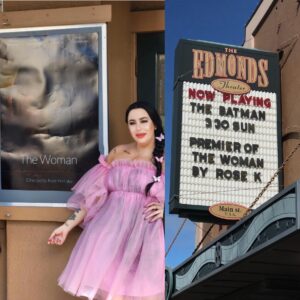
And that was The Woman?
Yes, it was The Woman. I wrote, produced, and directed it with only $1,000.
And you said that took just three months?
Correct. So I started writing it in October. We finalized the script in November of 2021. And then December, I spent the whole month prepping for my first film set day, which was in January. And again, I had no idea what I was doing, so I was just doing it on a whim after reading a couple of books, I didn’t really ask for help. I did it all myself. And we did everything from location scouting to writing the script to finding actors and cast and crew with no budget really. All the $1,000 went to the production costs. We didn’t actually pay the actors, but we found amazing actors and crew and now their careers have jump-started them. After the movie came out, became internationally recognized, we created a lot of hype for the movie and a lot of people here were interested in seeing it. Now it’s on 19 different streaming platforms and all of those people involved have careers in film now.
It was really fast. And it’s because I didn’t realize how long the ideation took. For a feature film, I didn’t realize that basically filming it can take upwards of six months and then another six months to edit. And I just was going really quickly because I wanted to get it out. Now I see things differently because I know how long it takes to edit or be on a film set. And so for The Woman we filmed every weekend, both days, in January, and that was a lot on the cast and crew. And now moving forward, we’re filming a couple of months, but one weekend, so like a Saturday or a Sunday, we’re not doing double days because that was a lot of work. It was like 12-hour days each day.
And so we filmed for six or seven days total for The Woman, and then we edited literally every single night, myself and the editor, we did it together and we edited Monday through Sunday until two in the morning, every day until March 13th. So we started editing in February. Basically we’re on calls every single night until early morning, and then some days we took days off of work so that we can edit together during the day. We had to re-shoot some things because there was traffic or whatever else going on. So we had to actually re-shoot a couple of things. And so we had to backtrack in February. And then March 13th we released the movie. Funny story is we weren’t even done editing it until the day before premiere, so it wasn’t even done until the day before we premiered the movie.
And then you made a short film, correct?
Yeah, the second one, I actually had a screenplay writer come to me with his script and say, “I saw your movie The Woman, and I want to for you to consider helping finish writing and direct A Room By The Road.” And I read the script and I said, “Hey, can we change a couple of things?” Because I decided that I had my own perspective on how to do movies even after just doing one. I got a groove going and some of the things and the scenes that he had, I didn’t agree with. And so I was able to change some things in the script and rewrite the ending completely. And then we filmed it only two months later in May. And since it was a short, it was only nine minutes long, we filmed it in one day and we released it on June 24th, so only a month later.
I find it really impressive that you’re able to make these films on such a short budget. I know technology has advanced a lot over the past 30 years, but I remember being blown away learning that Robert Rodriguez famously made El Mariachi for like $7000 and you’re working with a budget much, much smaller.
I think it goes to show that people are really scrappy and creative here.
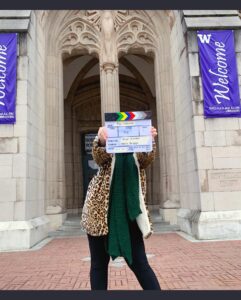
Yeah, absolutely. And I was wondering what was the experience like between you doing everything for The Woman and then being approached with A Room By The Road, which is a script someone else had. What was the difference like for you?
Honestly, I can’t think of any differences. I’m very hands-on. Some say I would be more controlling and I need to let go, which I do agree, I take on a lot. But I don’t have a PA that helps me write call sheets. I do that all myself. I never hire someone for location scouting, I do that all myself. I do the cast and crew hiring myself. I do the budgeting myself. And then when it comes to the script for The Woman, I wrote that in just like a week. And then I had it read by a couple of different people who finalized it, we changed some things together that made more sense for an audience’s perspective, that’s how I write everything is from an audience’s perspective.
And I feel like a lot of people that I work with, especially A Room By The Road, he knew just by talking with me on the phone that I was going to be more upfront and direct. So he was like, “You know what? I’m just going to give you the script and you can do what you want with it.”
It sounds like you’re still doing pretty much everything like you did with The Woman. What have you been able to learn to make it easier for you with your future films or your films after The Woman?
So I actually keep the call sheet template, which is I think the most time-consuming. And you really have to have a lot of organizational skills and be able to focus. For one call sheet can take me upwards of three hours because you’re putting in all the details for each scene. So what I like to do is keep a template now for the call sheet so that when I’m making a new film, I have that template and I’ve already gone through two and a half hours of work. All I have to do is fill in where the scenes go and for what day. Another thing is, since then for Christmases and birthdays, I’ve gotten books on successful filmmakers and how they do it. And then I familiarize myself with just watching classic movies that were on a low budget and see how they do things as well.
So I’ve basically just been able to study more so than when I actually decided to make a movie, is I didn’t need to do any studying. I just went along with it just from the knowledge of being on set as an actor. And then also just learning about how to interact with people on set, because as an actor, you don’t realize how much the crew goes through.
Can you tell me about your new movie coming out soon?
Wish You Well was filmed all in downtown Seattle along the waterfront and at Golden Gardens Beach, and we filmed that in one day, and it is a story written and produced by me. It’s about college nostalgia, basically. There’s three best friends from college and now they’re out of college with careers and their own lives, but they’re hanging out and they go to a fountain and they decide, “Hey, let’s make a wish.” And so they all throw in a penny. I don’t know if you’ve heard of the folk tale where you’re not supposed to pick up a penny unless it’s heads up because if it’s tails, then it’s negative. It’s like bad luck. And so I kind of did a double play on that where they all flip the coin in and then as the audience’s perspective, we see where their coins landed.
So one is heads up and the other two are tails up. So the next day, the people that wished and they got a tails up, their wishes went against them. So exactly what they asked for, it’s the opposite. And then the person that got the heads-up, all these good things are happening to them. And then they realize after a really terrible day or a really good day that it might’ve had to do with the wish. And so they all go back, and I’m not going to give away the ending, but it’s a really cool college nostalgia short film. We’re going to try to make it about 15 minutes long.
And where can people find you?
I’m on Facebook. You can type in Rose Kreider on Facebook and find me. But then also on Instagram, Rose Kreider. I do a lot of content creation. So recently I’ve been doing a lot of Grinch and Christmas reels. But in between all of that, I actually do post stuff about my movies and I will be starting to do movie reels, so clips of my favorite parts of my films put into reels, and so people can find out where to watch them and get excited about it again.
__________________________________________________________
Rose Kreider also just launched a GoFundMe to raise money for an adaptation of A Christmas Carol, which can be found here.
